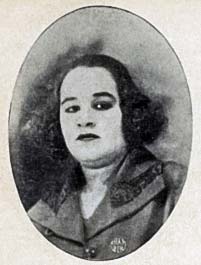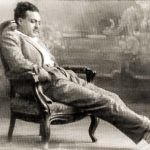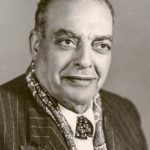Amar Foundation presents: Min Al-Tarikh
Mustafa Said: Welcome to a new episode of Men Al-Tarikh in which we will continue our conversation with Frederic Lagrange Pasha on Sheikh Zakariyya Ahmed.
M: Let’s now leave the Taqatiq to the Duets or Dialogues, and, again, let’s begin with one about the Faqihs Qabadan Qabadan.

Ratiba Ahmed
F: Qabadan Qabadan is a duet with Ratiba Ahmed. By the way, Sheikh Zakariyya Ahmed and El-Sett Ratiba Ahmed do not belong to the same family. It’s known that Ratiba Ahmed is the sister of both Mufida Ahmed and Fat’hiyya Ahmed. Fat’hiyya Ahmed was the singer who chose to sing in the Fus’ha or Classical style, i.e., Adwar and Qasaid, and, like Om-Kolthoum, she studied with Sheikh Abul-Ila Mohammed. Unlike her sister, however, Ratiba Ahmed, who didn’t have sufficient artistic, imaginative or vocal capacities to do the classical style, she specialized in Taqatiq. Her voice was really good, but neither as refined as Fat’hiyya’s nor did it have sufficient potential or mastery which one finds in Fat’hiyya’s voice. This is why she found herself in Taqatiq and duets or dialogues with Sheikh Zakariyya Ahmed. Qabadan Qabadan is a tune which goes to the same direction with Sayyid Darwish’s theatrical genre ….
M: Iqra Ya Sheikh Quffa’a
F: Yes, Qabadan Qabadan which is in Egyptian Arabic “Abdan Abdan” and it’s a mockery of those who act as Faqihs and who think that by turning the sound “A” in “Abadan” to “Q” may sound like Classical Arabic like most of the “Q” sounds in Classical Arabic which turn into “A” sounds in Egyptian spoken Arabic. This time, this Faqih is trying to pick up a woman not from the El-Ataba El-Khadra square as before, but in the Autobus or Swaris. This song has a special social value because it’s the first time to have a mention of the public transportation service in an Egyptian song.
M: [joking], Also, El-taxi Aal-bab Mistanni which is also his.
F: This song shows how widespread was this service and it also shows what was happening inside these buses, i.e., harassment. It’s a song against harassment, but not as we see in the 21st century, it was a beginning of a campaign against harassment in the beginning of the 20th century. It tells people what to do whenever this happens in such a public space where males and females meet, as this was a very important historical transformation in the Egyptian society.
M: [joking], yes, those days when both molesters and anti-harassment people still had some manners.
[now listen to Qabadan Qabadan, a duet between Sheikh Zakariyya Ahmed and Ratiba Ahmed.”.F: The value of Qabadan Qabadan unlike many other duets he made with Ratiba Ahmed, is more social than musical as it is not Maqamic or modal and the melodies do not represent the musical mastery of Zakariyya Ahmed. Let’s compare Qabadan Qabadan with another duet, e.g.,
M: Borreh me’l-afandiyya.
F: which has a social as well as a musical value simultaneously.
[Listen to Borreh me’l-afandiyya with Sheikh Zakariyya Ahmed and Ratiba Ahmed.”.F: I’m not sure whether there’s a relation between these duets and the lyrical theatre. I don’t know whether or not tunes like Qabadan Qabadan and others are taken from theatrical songs composed by Sheikh Zakariyya or they are new songs which had more effort exerted in them, and which were made with the same qualities for the recording labels. The duet wasn’t originally a typical Arab musical form, so it appeared in the 1920 …
M: An exception are the duets in the Qaragoz.
F: the question is: where did these duets come from? Surely from the lyrical theatre. They were either taken from the plays themselves or imitations of the theatrical duets themselves.
M: the evidence of this is the fact that some of them were recorded with an Arabic Takht and others were recorded accompanied by what they were then calling “orchestra”. I mean that some of these duets were accompanied by this very strange trio which appeared immediately after the first world war and which consists of a Piano, a Flute and a Violin; others were accompanied by a Takht; others were accompanied by a string octet as that which was known as “Gamil Eweis’ orchestra” which accompanied Munira El-Mahdiyya for example in El Giaconda. There was a transformation that shows that these duets, whether or not taken from the plays, were echoes of the lyrical theatre. Now, about the cinema.
F: The cinematic tunes are rather a continuation of the theatrical tunes with some differences. First: the movie songs were performed by professional male and female singers unlike the theatrical songs which used to be sung by actors and actresses who didn’t have to be professional singers. Second: making a movie was very costly which made the number of the songs proportionally less, which meant that the composer may have exerted more effort which resulted in much better songs,
M: [commenting], and he knew that these songs were recorded, videoed and existing, not only on stage and then forgotten. Most of the theatrical songs were only made for the stage and the recording labels were free to take these songs or leave them. Yet, in the case of cinema, he knows from the very beginning that they were made to be recorded. Let’s now listen to Sheikh Zakariyya himself taking about one of these songs entitled Bokra El-Safar which I personally like very much.
[Now to an excerpt from an interview with Sheikh Zakariyya.].Announcer to Sheikh Zakariyya: I’d like that you select one of your tunes that you like and tell me your memories about it, and I’ll have it played for you when you tell me your memories about it.
Sheikh Zakariyya: Yes, there’re very beautiful memories and other bizarre memories, you know, when one is stuck into a corner like a mouse in a trap.
Announcer: What was the song?
Sheikh Zakariyya: imagine when you receive a lyrical piece which has a two-word refrain to be repeated by the chorus: Bokra El-Safar. Only this. Not “Bokra El-Safar Ya Habayib” or “Bokra El-Safar Yakhwanna” or “Bokra El-Safar ya hoo”. And, I asked Mr. Rami “Hey ya Ustaz Rami, what’s that? Do you intend to make me crazy? Do you want me to keep repeating Bokra El-Safar, Bokra El-Safar, Bokra El-safar like in Zikr as Ya Lateef Ya lateef or Allah Hayy Allah Hayy? There’s no space for one to do anything.”, he answers: “Wallah my dear, I know and I excuse you. I excuse you, but what can I do!!! Badrakhan tells me (This is cinema and we needn’t any chitchat or such)”. I remained like that for 11 days I swear until I felt that I was about to die. After that, God made it easy for me: I thought about the subject. What was the situation of Om-Kolthoum? The Caliph worked against the man who was in love with her and he transferred him to such and such place in such a dark night with cold, thunder and lightning. Her concubines came to her and told her with joy: “Hurrah, don’t you know that they transferred him and we’ll travel tomorrow?!”. She wondered: “Really tomorrow?”, they answered: “Yes, really tomorrow.”, “Really tomorrow”, “Tomorrow”, “Then Tomorrow”. I made use of this repetition and I got out with an idea for the tune: “Bokra El-Safar, bokra bokra bokra”, let’s repeat these two words and I got out of the trap thanks to God’s help, and the tune came as you heard it.
Announcer: I was wishing to make you listen to Bokra El-Safar but unfortunately, the record is not available as a disc in the radio library.
Sheikh Zakariyya: I thought it’s full of reels some of which are for …
Announcer: We’ve it as a film only, not as a disc. I believe it would be very beautiful if you sing it for us.
Sheikh Zakariyya: Ok, with pleasure. I’ll sing part of it for you.
[Listen to sheikh Zakariyya singing Bokra El-Safar on his Oud].Announcer: Very beautiful.
Sheikh Zakariyya: Thank you.
[End of radio interview]. [Listen to Bokra El-Safar from the original recording by Om-Kolthoum].M: How would you like us to end this episode?

Salih Abdel-Hayy
F: In order to end this, I want to return to the Taqatiq with the very beautiful voice of Salih Abdel-Hayy. Let’s listen to one of the most beautiful Taqatiq that he recorded of Zakariyya Ahmed’s compositions in which has a sort of innovation in the romantic vocabulary: Addar Dah we Dah is his, correct?
M: Yes.
F: “Addar dah we dah, yama nas kimalit adad”. What’s bizarre about this song is the vocabulary used in the lyrics. The lyrics are romantic blame, yet it is very clear that there was an attempt at renewing the vocabulary in the romantic songs. This is almost a unique song in this direction, and I think that Sheikh Zakariyya was really successful in composing the music for this Taqtouqa.
M: So, let’s end with Addar Dah We Dah with Salih Abdel-Hayy, Colombia and Sheikh Zakariyya Ahmed.
[Listen to Addar dah we dah.].End of the second episode.
- 221 – Zakariyya Ahmed – 12 (1/9/2022)
- 220 – Zakariyya Ahmed – 11 (1/9/2022)
- 219 – Zakariyya Ahmed – 10 (11/25/2021)
- 218 – Zakariyya Ahmed – 9 (10/26/2021)
- 217 – Zakariyya Ahmed – 8 (9/24/2021)
- 216 – Zakariyya Ahmed – 7 (9/4/2021)
- 215 – Zakariyya Ahmed – 6 (8/28/2021)
- 214 – Zakariyya Ahmed – 5 (8/6/2021)
- 213 – Zakariyya Ahmed – 4 (6/26/2021)
- 212 – Zakariyya Ahmed – 3 (5/27/2021)
- 211 – Zakariyya Ahmed – 2 (5/1/2021)
- 210 – Zakariyya Ahmed – 1 (4/28/2021)
- 209 – W-al-Lāhi lā astaṭī‘u ṣaddak 2 (4/6/2017)
- 208 – W-al-Lāhi lā astaṭī‘u ṣaddak 1 (3/30/2017)
- 207 – Bashraf qarah baṭāq 7 (3/23/2017)


